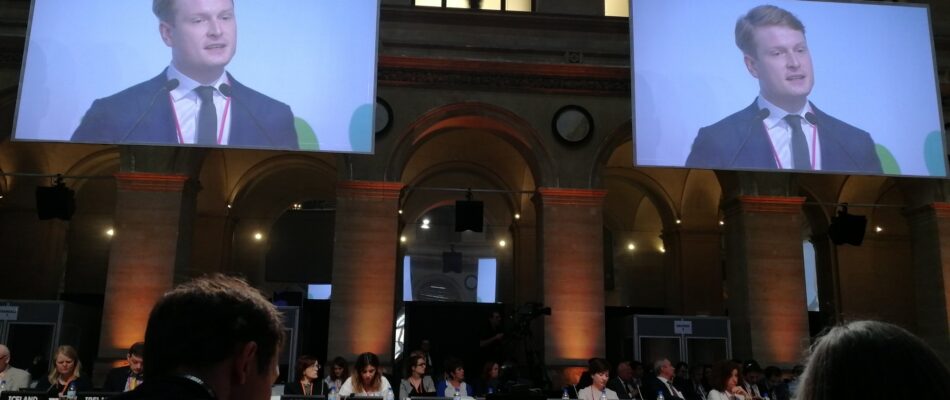
Our President, Helge Schwitters at EHEA Paris 2018
Dear Ministers.
In some minutes we will adopt a new communiqué for the EHEA. We thank you all for ending up with a document that we can fully support. However, now the work starts towards the Ministerial in Rome in two year’s time. The European Students’ Union would like to address some things we would like to see.
It has repeatedly been pointed out that the Sorbonne declaration was not only created upon a shared goal to ease mobility and recognition but also on the fundamental values that built European society.
Although these fundamental values cannot be emphasised enough as prerequisites for HE within the EHEA – and we urge for a reiteration of them in the Paris Communique, as has been done in previous communiques- it is also time to make unequivocally clear these should not be mere words. Fundamental values are not just to be committed to but also need a strong defence when they are endangered. Committing to the value of institutional autonomy also means speaking out when the autonomy of an HEI is under threat; academic freedom means supporting and protecting students and staff when they exercise their autonomy.
Education is a precondition for a vibrant and sustainable democracy, but only if it has humanism, free research and academic freedom as its pillars. Only in this way we can challenge the ideas of ruling authorities and finding out that our arrangements and solutions could be improved. But this is not a given. Education is an institution of power. Many authoritarian regimes have used it to strengthen their rule. By making sure that civil servants are loyal to the regime, and its rule remains unquestioned. No wonder that kings all over Europe competed in building universities at the time of their introduction.
Only humanism and freedom of speech can counteract this and make sure that education and research benefits society. Institutional autonomy is essential, decision making by those looking for new knowledge, be it as a researcher or a student. Student participation is needed in a critical university. Not all countries live up to this. Many are still incarcerated and expelled from their universities for using their fundamental right of free speech. This also happens in EHEA countries.
It also saddens us that delegations are coming here without a democratically elected student representative. These representatives need to be accountable to their peers. One cannot just select “the best student”. Not all students are “excellent”, all voices need to be heard and form the students’ voice.
We were asked earlier this conference what a student is. Well, there is no ONE student. The student mass is diverse, and therefore one-size fits all approaches cannot be applied. Student centred learning recognises this. But we do know something about the typical profile of a student compared to the society at large.
- They are from a richer background than the average person
- Their parents are higher educated than those of the average person
- They are more likely to be white
- They are more likely to have the faith of the majority.
- They are less likely to need any kind of assistance to be able to study.
We have been talking about the social dimension for many years and included the importance of it in multiple communiqués, but little has so far been done. Good, concrete and practical solutions are lacking. Findings in the Bologna Implementation Report and Eurostudent show that we have a long way to go. ESU is, therefore, welcoming the social dimension being reiterated, and that there is a clear mandate for delivering on this before Rome.
Our expertise and experience are ready to be used, in fact, you can find some of this already. Bologna With Student Eyes, the students’ perceptions on the implementation of Bologna reforms in most EHEA has just been published. I recommend you to read it. One thing can be promised, the maps are not all green.
